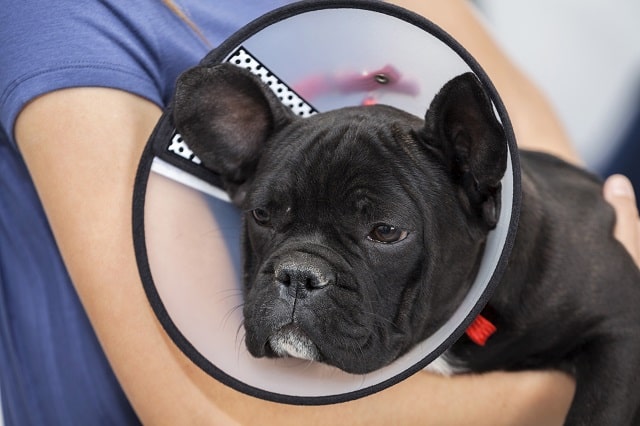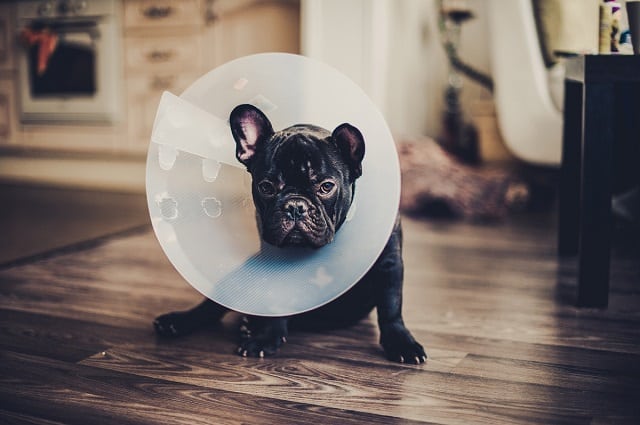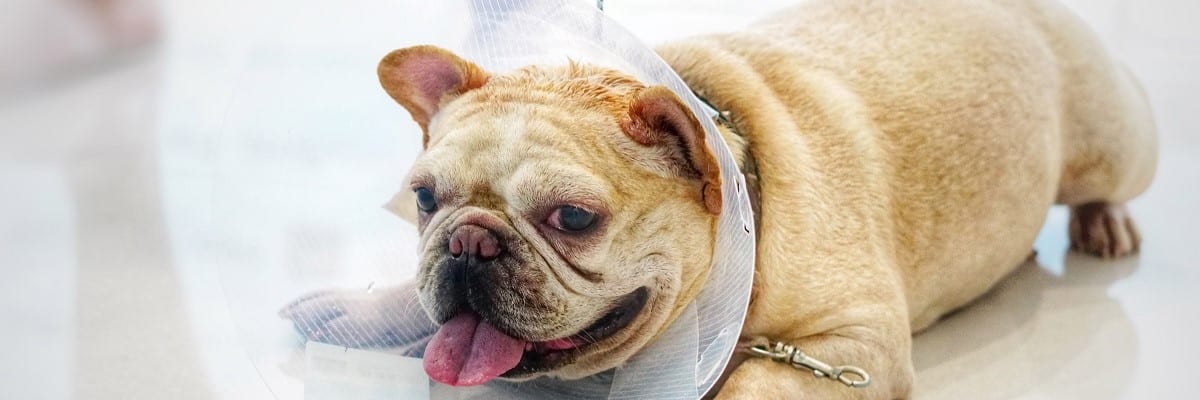When one brings home their new French Bulldog puppy, there may be a question about the benefits of neutering and when to do so.
Getting a French Bulldog desexed is an important decision that new dog owners must make with care, often in the earlier stages of a dog’s life, such as within the first year.
Some puppies are neutered as young as eight weeks, although this depends on the particular dog’s health and makeup. Six to nine months is a more realistic and generally acceptable timeline.
New owners ask several questions of a French Bulldog that may hesitate to neuter or have their French Bulldog desexed, such as having some apprehension that it may negatively change your French Bulldog’s behavior if the procedure is painful or if other complications may arise.
Some may worry that their male French Bulldog is too small or too young to have an operation or procedure that involves neutering or castration. Still, a young and relatively healthy French Bulldog may have little reason to raise concerns.
Technology and medicine have come a long way in our modern age, and neutering or getting a French Bulldog desexed today can be a fairly streamlined and simple process with desirable results.

Why should I get my French Bulldog Neutered?
There are many medical benefits to neutering a male French Bulldog earlier in life, as it can prevent certain prostate issues and testicular cancer.
The behavioral benefits of male French Bulldog neuter include reduced urine marking, decreased mounting of other dogs, people, or objects, and a likelihood to keep from wandering.
Male dogs left un-neutered are apt to roam and escape their home to find a mate, putting them at high risk of running into traffic, territorial or aggressive animals, and other natural dangers beyond the safety of their home.
Some breeders will have the new owner of a French Bulldog puppy sign a contract that promises to neuter or spay their French Bulldog within six months to a year from the dog’s birth.
There is a consensus among veterinarians that the best time to neuter a male dog is within six to nine months of birth. It is possible to neuter male dogs later in adult years, but there are certain risks related to age, health, and weight that may occur.
A French Bulldog owner must make this decision based on many factors; however, if the decision to neuter is made, it would be best to have the operation done before the first year after birth.
What Happens With Neutering?
Upon deciding to have a French Bulldog desexed, the process of French Bulldog neuter is a relatively straightforward one.
Neutering a male dog is called an orchiectomy, where both testicles that produce male hormones are removed from the body.
This is a different procedure from sterilizing a dog, which works to prevent a male dog from reproducing, but does not surgically remove the male organs responsible for undesirable behaviors such as urine marking, mounting, and wandering to find a mate.
What Happens First?
Before making an appointment to have a French Bulldog desexed, a veterinarian will usually require a pre-operation visit to establish a relationship with the canine and confirm records of necessary vaccinations.
Suppose the veterinarian selected to operate is not the French Bulldog’s primary veterinarian. In that case, the dog owner must make sure all records are up to date and accurate for the operating veterinarian.
Once the pre-operation visit has been completed and the veterinarian determines the French Bulldog is in poor health to proceed, they will explain the process of French Bulldog neuter to the dog owner.
The Actual Procedure Of Neutering
The procedure to neuter a male dog usually begins with applying pain medication, putting the dog to sleep, and implementing general anesthesia.
Many veterinarians will utilize an IV catheter to provide fluids and affix monitoring equipment to evaluate the dog’s heart rate, blood pressure, and oxygen during the surgery.
After ensuring the dog’s comfort, the canine will lay on its back and have the operation area shaved, cleaned, and sterilized. A small incision will be made just above the scrotum.
The veterinarian will then ease the testicles out of the incision, one at a time, and cut them from the spermatic cord. Sutures will be made to the cords, which are replaced in the body, and the incision is then closed.
Once the incision is closed, the veterinarian surgeon will inspect the incision site then prepare the dog to wake from anesthesia.
What Is The Average Cost Of Neutering?
The cost of neutering a French Bulldog will vary based on many factors, such as location, insurance, or even available practitioners. In the United States, clinics and organizations may offer services to neuter a dog for as low as USD 35.
These organizations are usually public animal clinics or shelters. Such places are often limited locations, primarily in larger cities and metropolitan areas. Many people are generally provided with a privately operated option of care for their pet, and the price for this procedure at such facilities usually costs upwards of $300 to USD 500.
Expenses to be considered beyond the surgery itself may also include other medications and post-operation visits or stays. A dog owner who will neuter their dog must be prepared to invest both time and money into the process and allocate some of that time to properly research the available facilities and services to them and their pets.
While having pet insurance may cover some expenses, as with regular insurance, not all organizations may accept the insurance carrier, or certain procedures may not be covered in full, if at all.
Post Operative Care of Neutering
After operation care, or post-operation care, is paramount as the French Bulldog comes out of anesthesia and wakes from surgery.
Some veterinarians will keep a dog that has been neutered or spayed overnight to monitor the canine for 24 hours post-operation to ensure that there are no immediate complications or reactions from surgery; most male dogs can return to their homes the same day of surgery.
The most challenging aspect for dog owners after a French Bulldog neuter operation will be to keep their pets from licking the incision and keeping them quiet and from engaging in too much activity.
After being neutered, a dog that is too loud or active runs the risk of internal bleeding, leading the scrotum to fill with blood and potentially requiring another surgery.
Providing a calm space with less excitement for the week or two weeks immediately following a French Bulldog neuter surgery will be important to manage this.
Licking the incision may cause infection or cause stitches to be removed prematurely. If your male French Bulldog cannot be kept from licking his incision, an “Elizabethan collar” or dog cone should be used to prevent such behavior.
While many dogs will experience common side effects such as lethargy or appetite loss in a day or two immediately following surgery, some dogs will experience pain that will require medication to manage.
It is important to closely monitor a dog’s behavior immediately after surgery to detect abnormal behavior, such as pain or aggression.
A dog owner will usually recognize if their pet does not resume normal behavior within the first week of post-operation recovery and should stay in touch with their veterinarian to ensure the dog remains in good health.
While modern technology has provided some facilities with the ability to apply stitches that will fall out on their own without the need for a surgeon, most stitches will require a post-operation visit within 7 to 10 days to remove stitches from the incision location.
Dog owners may also notice some swelling in the scrotum, which may appear as if the testicles are still present. This swelling will reduce over time in younger dogs, giving the appearance of a flatter abdomen area, while older dogs may present a flap.

Complications of Neutering
Complications after surgery for young and healthy dogs are rare and most commonly are limited to swelling or inflammation at the operation area.
Swelling, bleeding, fluids leaking from the operation area or the incision opening can occur and be worsened by licking or scratching at the incision site.
Older dogs, dogs with pre-existing medical conditions, and overweight dogs may be more at risk for post-operation complications.
Such complications will be subjective to the specific dog’s health or needs. The dog owner should speak in-depth with the operating veterinarian surgeon about any health conditions or medications to which such dogs are subject.
Conclusion
Deciding to neuter a male French Bulldog is a big decision and will require much thought and preparation.
Though the operation is relatively simple and quick, caring for and monitoring the French Bulldog after the surgery is important to be overseen with great diligence.
Doing so will ensure that both the dog owner and French Bulldog may enjoy one another for many years to come, reaping the many benefits of this investment of time, money, and care required.

